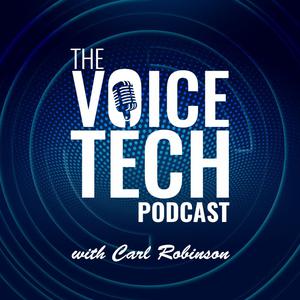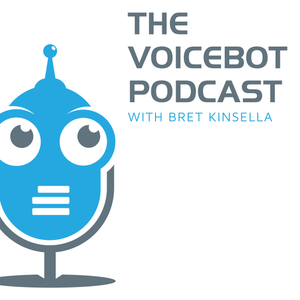
Voice Tech Podcast
Carl Robinson
Listen to conversations with voice technology experts, and boost your knowledge and technical skills. Learn from #voicefirst professionals about voice interfaces, voice assistants, chatbots, alexa, machine learning, data science and AI. Subscribe on Apple Podcasts, Google Podcasts, and Spotify, as well as Amazon Alexa, Google Assistant, Samsung Bixby and more.
- 46 minutes 20 seconds5 Fantastic French Startups - Vivatech 2021
Five different french audio startups explain what their companies’ missions are as they’re interviewed at the Vivatech 2021 mega-conference in Paris, France.
One french company that stood out was Cogneed, which focuses on the power of AI specifically when it comes to Inside Sales, Customer Care & Sales Development Reps, assisting them with dynamic display of relevant information, triggered by audio detection.
Then comes Storyfox, a video interview tool that companies can use to create structured interviews using templates. This could especially be beneficial for companies that are looking to hire new employees as it makes the process much quicker.
Next, we interview Playplay, an online video editing tool that allows anyone to create videos easily, as videos are the main form of content that users consume. It also has a new feature that can be used to create videos for podcasts including automated motion design and automatic subtitles.Afterwards, we learn all about Sonup, a startup that’s based in Montpellier. It’s an innovative and reliable solution for healthcare professionals wishing to offer their patients a hearing assessment service. They explain why their solution is important for people with hearing problems.
Last but not least, we get to know Odiho, a company that provides sound to soundless advertising, such as video billboards. People can scan the QR code on the ad to watch the video with sound on their cellphones.
Listen to the full episode to get the answers to all of your burning questions!Links from the show:
Sponsors:
- Manning books << 40% off all books code: PODVOICETECH19
- Conversation Design Institute << 25% off courses: VOICETECH25
- Rumble Studio << create your free account
Find us here:
★ Support this podcast on Patreon ★24 June 2021, 10:00 am - 58 minutes 41 secondsConversation Design Festival - Hans van Dam, CDI
Hans van Dam is the CEO of Conversation Design Institute, a company that teaches a human-centric workflow to conversation design which has proven itself in organisations around the world. This is Hans’s second appearance on the show, the first one being in episode 51 back in January.
Hans explains what exactly conversation design means and focuses on its importance regarding conversational AI technologies. He shares his vast experience with training conversation designers at CDI, in order to successfully automate conversations in 2021.
CDI’s Conversation Design Festival is coming up on June 15th. Attendees will learn from AI Trainers, Conversation Designers and Conversational Copywriters who will share their professional experiences and give advice on optimizing AI assistants like chatbots and voice assistants.
We hope to see you at the Conversation Design Festival on June 15th. Grab a ticket now using our discount code!
Links from the show:
- Conversation Design Festival << $50 discount code: VOICETECH100
- Become an Expert in Conversation Design << VOICETECH25
- Voice Tech Podcast ep.051
- Hans van Dam’s Youtube channel
Sponsors:
- Manning books << 40% off all books code: PODVOICETECH19
- Conversation Design Institute << 25% off courses: VOICETECH25
- Rumble Studio << create your free account
Find us here:
★ Support this podcast on Patreon ★7 June 2021, 9:00 am - 27 minutes 53 secondsReal-time Voice Changer - Jaime Bosch & Alex Bordanova, Voicemod
Jaime Bosch is the co-founder CEO of Voicemod, a massively popular real-time voice manipulation, augmentation & soundboard application for Windows PC. He is joined by Alex Bordanova, Director of Audio Experience at Voicemod.
Based in Valencia, Spain, Voicemod has amassed over 17 million registered users & is the number one choice to create a unique & powerful sonic identity, whether it’s for gaming, content creation, dungeon-mastering, or just hanging out with friends online.
We hear samples of a range of voice changing effects made by Voicemod & discuss the applications of these in various industries. We also dive into the challenges of real-time audio programming & hear about the lessons learned while building this awesome voice startup.
Links from the show:
- Voicemod
- Download Voicemod for free
- Voicemod on Youtube
- Voicemod is hiring! [email protected]
- Cyberpunk voicemod pack - ScreenRant
- Dark Vader voice - LifeHacker
- Voicemod raises 8 million - VentureBeat
- Voicemod on Windows Central
- The Golden Rules of Audio Programming, Pete Goodliffe
- Fabian Renn-Giles & Dave Rowland - Real-time 101
- Dave Rowland - Real-time Tradeoffs in Audio Programming
- Valerio Velardo Tutorials
Sponsors:
- Manning books << 40% off all books code: PODVOICETECH19
- Conversation Design Institute << 25% off courses: VOICETECH25
- Rumble Studio << create your free account
Find us here:
★ Support this podcast on Patreon ★18 May 2021, 8:00 am - 13 minutes 41 secondsA.I. Service Desks - Muddu Sudhakar, Aisera
Muddu Sudhakar is the CEO of Aisera, the world’s first solution to use Conversational AI and Conversational RPA to transform the Service Desk in the Enterprise.
We discuss how enterprises are using Aisera’s A.I. to automate and auto-resolve service desk requests from both employees and customers.
Muddu predicts that service desk tools will be used less over the coming years, to be replaced by self-service AI-powered Conversational platforms on collaboration tools like Zoom, Microsoft Teams and Slack.
Links from the show:
Sponsors:
- Manning books << 40% off all books code: PODVOICETECH19
- Conversation Design Institute << 25% off courses: VOICETECH25
- Rumble Studio << create your free account
Find us here:
★ Support this podcast on Patreon ★4 May 2021, 2:00 pm - 39 minutes 33 secondsVoice Transformation - Marco Liuni, Alta Voce
Marco Liuni is the co-founder and audio miner at Alta Voce, a research-backed startup based in Paris, France that shapes the emotions in human and artificial voices to enhance communication.
Their product, Alta Call, is a voice transformation technology for contact centers, improving both the clarity of speech and enhancing the smile in the voice. Marco explains how their tech works, and we hear samples of audio that have been transformed.
We also cover some of the ethical issues of transforming human voice, and how they are tackling this in the product. Marco shares his advice for newcomers to the field of speech transformation, and some of his recommended reading.
Links from the show:
- Alta Voce (alta-voce.tech)
- IRCAM
- Italo Calvino - Invisible Cities
- Reinventing Organisations - Frederic Laloux
- Voice Tech Podcast - Pablo Arias, Smiles in the Voice
Sponsors:
- Manning books << 40% off all books code: PODVOICETECH19
- Conversation Design Institute << 25% off courses: VOICETECH25
- Rumble Studio << create your free account
Find us here:
★ Support this podcast on Patreon ★6 April 2021, 9:00 am - 55 minutes 18 secondsInteractive Storytelling - Christian Mahnke, EarReality
Christian Mahnke is CEO of EarReality, which helps some of the biggest companies in the world such as Disney, Audible, and Vox create interactive stories for voice marketing. Their stories are published on Amazon Alexa, Google Assistant, Samsung Bixby and more.
Christian shares some of his best practices for interactive voice writers, including why it's important to write characters that people identify with.
EarReality is set for success with the upcoming launch of Twist, their interactive storytelling tool for voice technology. Find out more by giving this episode a listen!
Recorded asynchronously on Rumble Studio
Links from the show:
- EarReality
- [email protected]
- Iron Falcon
- LinkedIn l Christian Mahnke
- Amazon Alexa Games Skill Challenge Winners Announced for Europe l Voicebot.ai (1st prize)
- EarReality wants to help storytellers find their voice l Bixby Developers
- Why Obsidian uses AI voices for game development l Sonantic
TWIST - Tutorials
Sponsors:
- Manning books << 40% off all books code: PODVOICETECH19
- Conversation Design Institute << 25% off courses: VOICETECH25
- Rumble Studio << Create your podcast for free
Find us here:
★ Support this podcast on Patreon ★23 March 2021, 9:00 pm - 39 minutes 31 secondsWordPress to Alexa - Christian Petroske, ShoutWorks
Christian Petroske is President of Shoutworks, a new Wordpress plugin that lets you publish content to Amazon Alexa with the push of a button. ShoutWorks lets you send notifications through Amazon Alexa, with a 90 percent plus open rate. This helps publishers grow their audience, get more leads, and boost sales in a few clicks.
In this episode, Christian and host Carl Robinson discuss the Shoutworks Wordpress plugin, what it is, and how it helps you create an Alexa skill in just one click. Christian also discusses why the pandemic is a good time to launch a voice start-up, and what’s currently holding the voice tech industry back.
Christian discusses why his team took a template-first approach, and the benefits to developers and end-users. Voice Tech finds out what Christian believes is holding back the voice industry right now, along with why launching a voice startup during a pandemic is a very smart move! This sophisticated Shoutworks plugin allows smaller publishers to use the content from their blog, and then through the plugin send notifications to Alexa seamlessly.
Until now, this accessibility has only been available to larger publishers, including NPR, Coca-Cola, because megabrands such as these can spend thousands of dollars on creating Alexa skills. This has allowed big-name brands to drive significant traffic to their Wordpress sites via Shoutworks. Shoutworks’ goal is to democratize access to Amazon Alexa. It is super easy to use, and takes away the expensive and time-intensive aspects of building an Alexa skill.
The real problem Shoutworks is solving is for small businesses and entrepreneurs to build an audience and drive engagement over this new voice tech medium. With voice tech, businesses definitely have less competition, and the possibilities for deeper engagement are actually greater. Shoutworks is changing the playing field for smaller publishers with limited resources, opening up new opportunities for massive engagement.
Links from the show:Sponsors:
- Manning books << 40% off all books code: PODVOICETECH19
- Conversation Design Institute << 25% off courses: VOICETECH25
- Digital Assistant Academy << 25% off courses: DAVID25
- World Class Business Leaders EU conference << 30% off tickets: VoiceTech30EU
Find us here:
★ Support this podcast on Patreon ★30 November 2020, 1:00 pm - 36 minutes 28 secondsAlexa Skill Numbers - Simon Landry, Voice Market Data
Simon Landry is the founder of Voice Market Data, a service that makes voice market data more accessible to voice developers. We discover how a macro view of the Alexa marketplace can help us measure app success in different markets, spot new product opportunities and feature ideas, and highlight discoverability issues.
Simon’s extensive academic background has given him a unique ability to unearth rich data, and present it in an accessible format that can be understood by all. This is a fascinating look at the true nature of the Amazon Alexa marketplace and makes for essential listening for all voice app developers and creators.
Links from the show:
- Voice Market Data
- Simon Landry on LinkedIn
- Simon’s book: The Science of Conversational Design
- Simon et Guy Cours en Francais
- Empathy Engine
- Poop Detective Alexa Skill
- Alexa in Canada Podcast with Simon
Sponsors:
- Rumble Studio
- Manning books << 40% off all books code: PODVOICETECH19
- Robocopy Conversation Design Course << 25% off with this link
Find us here:
★ Support this podcast on Patreon ★2 November 2020, 11:00 am - 59 minutes 9 secondsPodcast Tips, Tools and Voice - Carl Robinson, Rumble Studio
This episode was created by Roger Kibbe, senior developer evangelist for Viv Labs/Samsung, for the Bixby Developers Chat podcast. Roger interviewed me, Carl Robinson, about my new project, Rumble Studio. It’s an innovative new tool for recording podcasts and audio content asynchronously; and yes, we used Rumble Studio to record this podcast!
Here’s what Roger wrote in the original podcast description:
We discuss how Carl got involved in podcasting and what he has learned 70+ podcasts in. Carl gives some very valuable advice for both beginning podcasters and more experienced podcasters.
We then discuss Rumble Voice, the innovative new way to record podcasts and other audio content. Using Rumble Voice, the questions and answers (host and guest) can be recorded asynchronously. This podcast was recorded using Rumble Studio and I recorded all of the questions from my home office in Walnut Creek, California at my leisure. Carl recorded his answers from Paris, France at his leisure. Rumble studio takes care of the logistics and then stitching everything together at the end. It's truly a different way of creating audio content like podcasts.
We discuss the high costs/effort required to create quality audio content and how Rumble Studio was created to alleviate this problem. We also discuss how Rumble Studio unlocks creating short-form audio which can be recombined into new content and the exciting possibilities for web search engines to index audio content.
We finish by discussing the state of the voice industry. What is working right now and what needs improvement. And where voice can go.
Roger gives a short 2-minute review of Rumble Studio at the end of the podcast.
Links from the show:- Rumble Studio - https://rumble.studio/
- Rumble Studio LinkedIn - https://www.linkedin.com/company/rumble-studio/
- All Bixby Developers Chat Episodes available at:
- bixbydev.buzzsprout.com/
- Carl Robinson - Twitter: @VoiceTechCarl
- Carl Robinson - LinkedIn: https://www.linkedin.com/in/carlrobins0n/
- Voice Tech Podcast - https://voicetechpodcast.com/
More about Bixby:
- Samsung Bixby is a next-generation, AI platform that enables developers to build rich voice and conversational AI experiences for the Bixby Marketplace, and Bixby devices including phones, watches, televisions, smart appliances, and more.
- Bixby Developers Homepage - https://bixbydevelopers.com/
- Bixby Developers Github - https://github.com/bixbydevelopers
- Bixby Developers YouTube Channel - https://www.youtube.com/c/bixbydevelopers
- Bixby Developers Twitter - twitter.com/BixbyDevelopers
- Bixby Developers Facebook - https://www.facebook.com/BixbyDevelopers/
Find us here:
★ Support this podcast on Patreon ★12 October 2020, 10:00 am - 1 hour 11 minutesVoice X Design Sprint - Maaike Coppens
Design Sprint was greeted by Jake Knapp, and the idea is to build and test a prototype in only five days. A small team works for a week to rapidly progress from problem to tested solution, using a proven step-by-step checklist. Jake describes it as fast-forwarding into the future so you can see how customers react before you invest all the time and expense of building a real product.
The Design Sprint is a method that has been adopted across digital industries to make better product designs in a faster period of time. The sprint goes from a challenge to a prototype for users. The sprint has strength in the fact that it allows input from users from the very start, and the intense period of everyone working together inevitably results in success.
Maaike has been consulting in voice since the beginning. At the start there were challenges because no one knew how much artificial intelligence could do for voice technology. Next, everyone had diverse ideas and team alignment around projects was difficult. Not everyone had the same knowledge, and there was not enough user knowledge.
Because of these challenges, Maaike began to look at the methodology around team alignment and speed. That’s where Design Sprint came into play. Maaike Coppens began doing some Design Sprint and quickly saw it solved a lot of problems, but it did not solve the learning gap or learning gap for participants when it came to artificial intelligence.
The Voice X Design Sprint was borne of these different elements. It is platform-agnostic and takes into account all different variations and domains voice can be a part of. Voice X Design Sprint leverages what voice technology is about, so that people can not only understand with their mind what voice technology is about, what users are experiencing with their brand. Voice X embodies these things through serious plan, through role play.
Links from the show:
- Greenshoot Labs
- Maaike Coppens
- Maaike Coppens on LinkedIn
- Stephane Crouchon, founder, Design Sprint
- Heidi Culbertson - Promptful.ai
- Become a Voice Tech Pro
- com
- GM Voices
Sponsors:
- Voice of Money 2020 Conference << 30% off with VOICETECHCARL
- Manning books << 40% off all books code: PODVOICETECH19
- Robocopy Conversation Design Course << 25% off with this link
Find us here:
★ Support this podcast on Patreon ★28 September 2020, 7:00 am - 19 minutes 44 secondsSpeech Processing for Disease - Prof. Ami Moyal, President, Afeka Tel Aviv College of Engineering
Imagine if voice technology could be used to diagnose diseases! This could be a reality if voice tech is used to identify non-speech sounds, such as coughs. This focus is of particular interest at the moment as the world’s governments rally resources to protect populations against COVID-19.
This is one area of focus for this week’s guest, Prof. Ami Moyal, President, Afeka Tel Aviv College of Engineering, Israel. Prof. Ami also talks about the future of voice technology and what we should be teaching children for them to be successful in the world.
Teaching is the main function of Afeka, but it does focus on research and applied research, in collaboration with industry. This stimulates a culture of creativity.
The Afeka Centre for Language Processing has been researching the use of speech processing and artificial intelligence algorithms for providing a quick and readily available pre-diagnostic assessment of COVID-19 infection, without the need for human intervention.
When it comes to a rapidly spreading virus such as COVID-19, with millions of potential carriers amongst the global population, it is essential to identify likely carriers of the virus at the early stage of infection in order to prioritize testing efforts and break the chain of transmission.
Among the earliest symptoms of COVID-19 are vocal cord edema and vocal cord infection. These affect vocal cord patterns. Afeka is modelling samples of speech, coughing and breathing, from both symptomatic and asymptomatic carriers, to compare with models taken with health subjects. Afeka is also modeling vocalization of subjects that tested negative for COVID-19, yet are exhibiting similar symptoms. This will allow the differentiation between someone who is a carrier, and someone who is not.
Prof. Ami says that people were initially hesitant about using voice commands. But this perception has changed, even for simple voice commands. In the not-so-distant-future, we will be able to communicate with any object or machine using our voice. Machines will be able to communicate with humans, using simulated voices.
Taking Afeka’s COVID-19 research a step further, Prof. Ami says he imagines one day that our voices will be analyzed continuously by our cell phones, which will notify us in real time when to go and see a doctor, because it has discovered a change in our voice that may result in an ailment.
Google, Amazon, and Facebook have defined speech recognition as a strategic goal. This will lead to major advances in the use of speech recognition. Eventually, we will be able to communicate freely with any device, whether it’s our mobile phone, refrigerator, robot, or our car.
For content producers, they must think about how they are producing content for the search algorithms of the future. Searches will be instigated through voice recognition.
Looking to the future, we need to equip children with both the skills and the knowledge to use speech recognition technology. The current generation must be able to analyze data, and be able to solve unpredictable problems.
Links from the show:Sponsors:
- Digital Book World 2020 Conference << 30% off with VOICETECHCARL
- Manning books << 40% off all books code: PODVOICETECH19
- Robocopy Conversation Design Course << 25% off with this link
Find us here:
★ Support this podcast on Patreon ★15 September 2020, 8:00 am - More Episodes? Get the App
Your feedback is valuable to us. Should you encounter any bugs, glitches, lack of functionality or other problems, please email us on [email protected] or join Moon.FM Telegram Group where you can talk directly to the dev team who are happy to answer any queries.
 The Alexa Podcast
The Alexa Podcast
 The Voicebot Podcast
The Voicebot Podcast
 On-Chain Experiments
On-Chain Experiments
 Alexa in Canada
Alexa in Canada
 VUX World
VUX World
 Inside VOICE
Inside VOICE